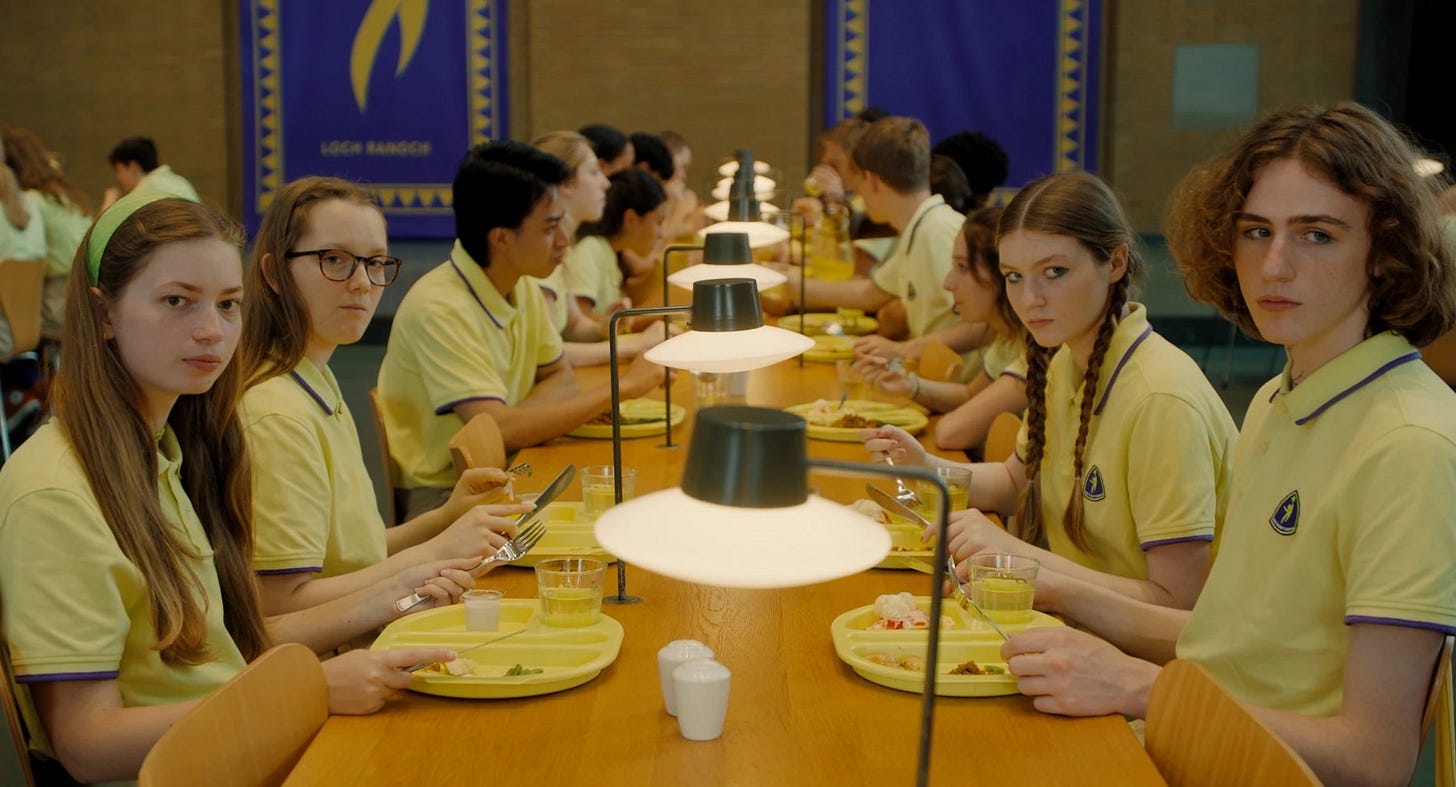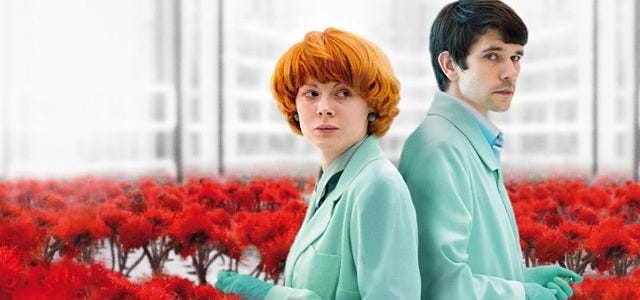Fatalism and fasting - Jessica Hausner's Club Zero
Jessica Hausner's film Club Zero resists easy interpretations or redemptive conclusions. It's sickly colourful backness is in tune with an angst-riddled zeitgeist.
Whenever I prepare to interview a film director about their work, the echoes of Barthes’ “Death of the Author” reverberate in my head. How do you talk about the work without falling into the trap of asking, in various phrasings and rhetorical gymnastics, “So, what did the film mean?”
This, from the standpoint of the French semiologist, would succumb to interpretive tyranny—the flawed idea that an author possesses the definitive meaning of a text.
Even worse, however, would be to plunge confidently into an outline of one’s own reading and then sit back, expecting to have your thoughtful exegesis confirmed by an impressed and grateful director. The subsequent conversation sparkles with witty repartee in a meeting of kindred cinematic minds (followed, obviously, by a sincere invitation to consult on the director’s next project).
In my experience, film directors fall into three categories when reacting to an eager interviewer asking—or offering—interpretations:
The type that refuses outright to discuss their own meaning of a film. (This is fine but can be tricky to navigate if they don’t want to talk about interpretation itself, leaving one stuck on process or, worse, how wonderful it was to work with so-and-so.)
Those who suggest the meaning of the film is obvious (and if you, dear critic, have watched the film and missed it, you’re either not a very good critic or were asleep).
The type genuinely interested and curious to respond to interpretations in good faith—theirs, yours, and others that may have come up.
Thankfully, my discussion with director Jessica Hausner tended toward the third variant, a good thing considering her new film Club Zero (out in the UK Friday, 6th of December) defies reductive or secure interpretations.
Watching the film twice before speaking to Hausner confirmed just how at odds its aesthetic precision and coherence are with any specific ideological sensibility.
In the week leading up to the conversation, I watched four of her previous films: Hotel (2004), Lourdes (2009), Amour Fou (2014), and Little Joe (2019). I’d seen Lourdes previously, but rewatching it in the light of Club Zero, it struck me how a fundamental yet ambivalent interest in the concept of faith grounds Hausner’s cinematic vision.
In Lourdes, organized religion—particularly the ancient site of alleged miracles where devout Catholics pilgrimage to this day—receives a nuanced scrutiny of mystery as a construct. Faith, in its most romanticised sense, is undercut by Hausner’s sombre cinematic microscope. In Amour Fou (2014), the notion of faith is reexamined with cool irony, dramatising the true story of a death pact between poet Heinrich von Kleist and his lover Henriette Vogel.
Hausner’s audiovisual style deliberately treads a line between detachment and critique, observation and provocation. She returned to a modern context with Little Joe, a creepily prescient (in the light of COVID) sci-fi film that reminded me of The Day of the Triffids and Invasion of the Body Snatchers. The conceit of the film, along with its sharply defined production design and cinematography, creates a veneer that, once again, allows questions of belief and guilt—both culpability and shame—to rise to the fore.
It would be easy to define Club Zero as something of an evolution from Little Joe. Perhaps Hausner’s most starkly “of the moment” film, it is a sickly, cynically humorous meditation on the fragility of constructed belief systems and the malleability of human behavior.
Set in the vaguely defined space of a wealthy, Western school that could be anywhere and nowhere, Club Zero explores the mechanisms of manipulation and the collapse of certainty, all while maintaining the calculated ambiguity that has become Hausner’s signature.
Trying to get a handle on the film’s concerns from her perspective, I brought up the Pied Piper myth, which she had mentioned in a previous interview. The dark aspects of fairy tales—how easily people, especially children, can be seduced by authority figures wielding promises of salvation—offer rich possibilities for modern translation.
In this case, salvation comes in the form of Ms. Nowak, played with an eerie mix of girlish sweetness, earnestness, and studied manipulation by Mia Wasikowska. Nowak’s philosophy of “conscious eating,” a program ostensibly designed to foster self-discipline and environmental awareness, soon descends into a cult-like ethos of denial and self-sacrifice. The teenagers stop eating, believing they are on a righteous path. Their parents, for differing reasons, only slowly grasp the extent of their radicalisation. Indeed, it’s fascinating to think through the diffuse layers of guilt in the parent-student-teacher triad.
Hausner’s approach to character works in tandem with the observational camera. It’s not quite at the level of Bressonian detachment, but the tonal flatness of the actors’ movement and speech negates emotional enunciation in performance, favouring instead a patterned performativity that suggests “being” is largely a set of ingrained codes.
Her characters are not meant to feel “authentic” but instead function as archetypes—symbolic figures repeating the language and gestures of the societies they inhabit. “We speak in stereotypes,” she says. “I like to show how much we just repeat what other people said to us.” Compared to the psychological realism we are used to, her characters might feel wooden or stiff, but this is the point: in a world dominated by prepackaged ideologies, even language becomes a tool of conformity.
The film’s critique extends beyond the school to the families of the children, each a microcosm of larger social trends. The liberal, progressive parents, with their sleek homes and casual virtue signalling, appear no less seduced by ideologies than their children. For me, though, generational miscommunication stems from parents who see their role as a lifestyle choice or a foundation for their own ego.
Club Zero becomes a meditation on the universal human desire for structure, control, and belonging, even at the expense of individuality or critical thought. Hausner’s work suggests someone highly skeptical of free will.
The director’s collaboration with cinematographer Martin Gschlacht reinforces this sense of detachment. The camera in Club Zero watches its subjects with a cold, unfeeling eye. This indifference is simultaneously unsettling and revelatory, mirroring the detachment of Ms. Nowak and the broader systems of control the film critiques. The soft zooms, precise framing, and careful camera movement take on a double meaning: the modern experience as a schizophrenic tension between oppressive surveillance and the desperation of wanting to be seen.
The focus on eating is such an apt device for engaging with complex thematic layers. Denying themselves food becomes a form of self-control the students feel they are searching for, tapping into teenage desires for autonomy while also reflecting the pressure to conform. Club Zero presents a milieu where innocence and playfulness are drained by expectation, professionalisation, and productivity—even in childhood.
Perhaps the more profound aspect of this is recognition of how seductive control can be. “Not eating is a very powerful thing,” Hausner observes. “If you learn how to control your own body, it empowers you.” This, she suggests, is why ideologies, even destructive ones, are so attractive: they offer the illusion of mastery in an uncontrollable world.
As Ms. Nowak pushes her class toward extreme progressions, eating becomes emblematic of modern anxieties and their micro-politicisation. The refusal of food for these hyper-aware students becomes an emblem of their will to power, encompassing grand discourses of our age—particularly environmental disaster and consumerism. Hausner shows how righteous individualism and rebellion are easily co-opted into ideological control.
Club Zero is neither satire nor critique nor, for that matter, out and out howl at the mood nihilism. It simply observes, inviting viewers to confront the ambiguities and on contradictions of their own beliefs and behaviours. Hausner offers no solutions, no moral clarity. And perhaps because of this the film resonates with the times. This is not to say it will be entertaining or satisfying to watch. Indeed, as it sinks relentlessly into the darkness, concluding with an ironic final word, both menacing and resigned—uttered by one of the indoctrinated children—that undercuts any sense of salvation.
To listen to the full interview with Jessica Hausner click below to become a paid subscriber. Very much appreciated.
Keep reading with a 7-day free trial
Subscribe to Contrawise to keep reading this post and get 7 days of free access to the full post archives.







